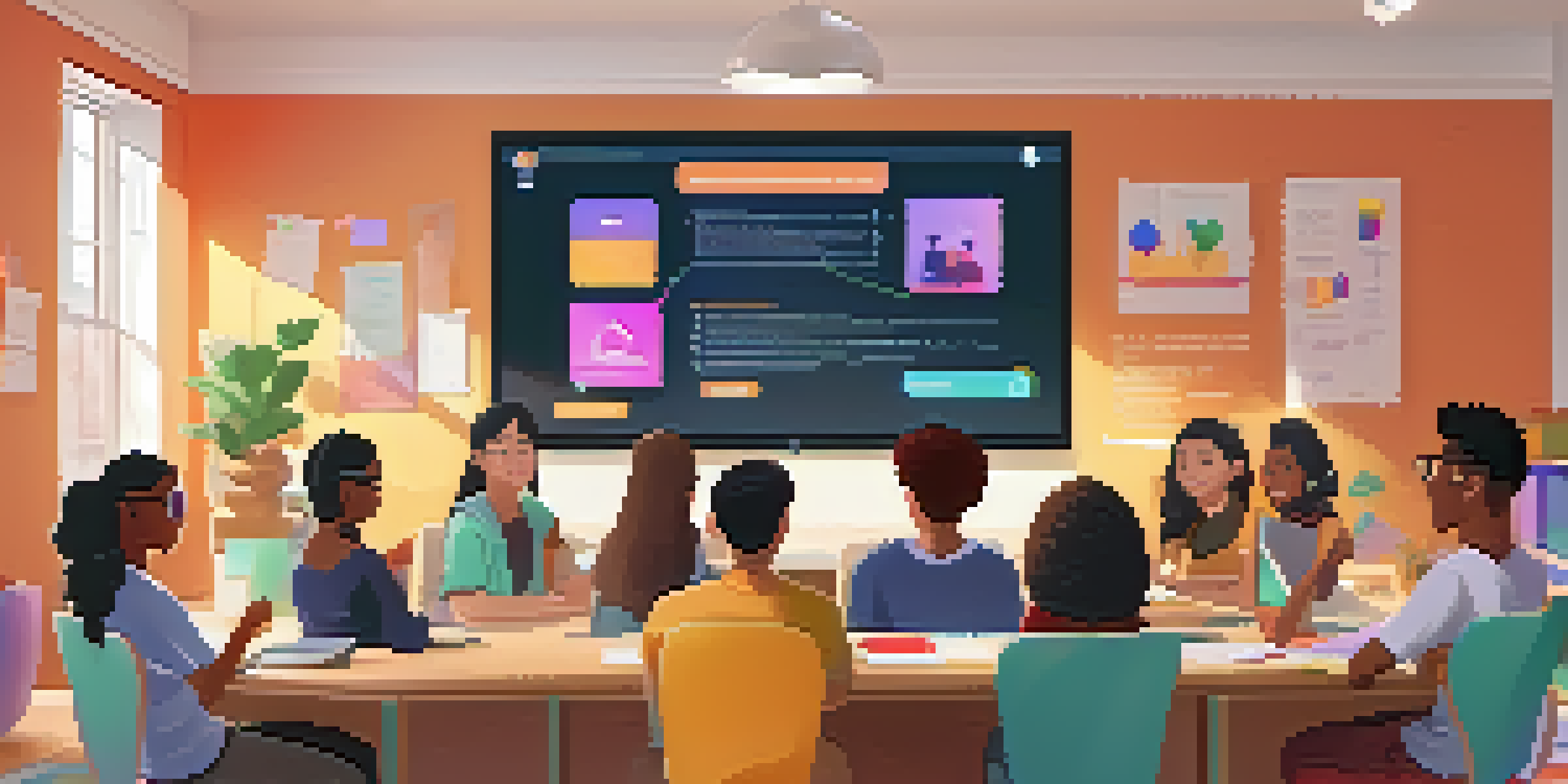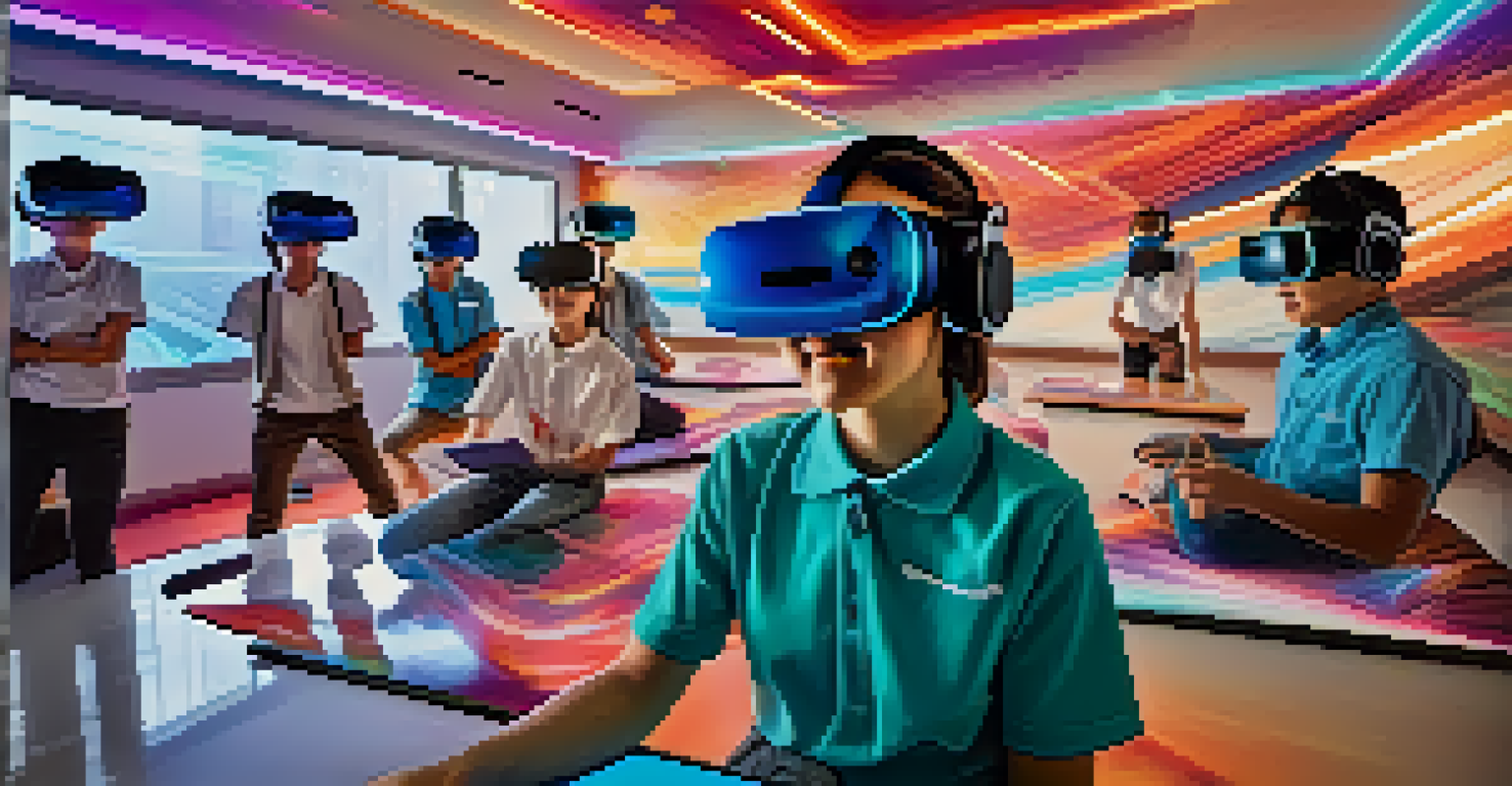The Role of Technology in Shaping Online Learning Experiences

The Evolution of Online Learning Through Technology
Online learning has come a long way since its early days, evolving from simple email correspondence to immersive digital classrooms. Initially, courses were static, often relying on PDFs and basic video lectures. However, the advent of technology has introduced dynamic platforms that make learning interactive and engaging.
The great thing about online learning is that it allows for a personalized experience that can adapt to the unique needs of each student.
Today, various tools like Learning Management Systems (LMS) and video conferencing software allow for real-time interaction between instructors and students. This shift has made education more accessible, breaking geographical barriers and democratizing knowledge. As a result, learners can now connect with educators from around the globe, enhancing their educational experience.
Moreover, the ongoing development of technology means that online learning continues to evolve. Innovations such as artificial intelligence and virtual reality are paving the way for even more transformative experiences. This constant evolution highlights the central role technology plays in shaping the future of education.
Interactive Learning: Engaging Students Effectively
One of the most significant advantages of technology in online learning is the ability to create interactive content. Features like quizzes, polls, and discussion forums keep students engaged and encourage active participation. This interactivity not only makes learning more enjoyable but also helps reinforce key concepts.

For instance, platforms like Kahoot! and Quizlet allow educators to create fun, competitive quizzes that motivate learners to participate. Such tools provide instant feedback, helping students identify areas for improvement in real-time. This engaging approach fosters a sense of community and collaboration among peers.
Technology Transforms Learning
The evolution of online learning through technology has made education more interactive, accessible, and engaging for students worldwide.
Additionally, gamification—integrating game-like elements into learning—further enhances engagement. By turning lessons into challenges or rewards, learners are more likely to stay focused and motivated. This method not only makes learning fun but also reinforces the idea that education can be an enjoyable journey.
Personalized Learning Experiences Through Technology
Technology enables personalized learning experiences tailored to individual student needs. With adaptive learning systems, courses can adjust content and difficulty based on a learner's progress. This customization helps ensure that each student can learn at their own pace, which is crucial for effective learning.
Education is the most powerful weapon which you can use to change the world.
For example, platforms like Edmodo and Khan Academy use algorithms to assess student performance and recommend resources that align with their learning styles. This personalized approach empowers students to take charge of their education, making them more engaged and accountable for their progress.
Furthermore, personalized learning fosters inclusivity, allowing students with diverse backgrounds and abilities to thrive. By providing tailored resources and support, technology ensures that every learner can achieve their educational goals, bridging gaps that traditional methods might overlook.
Access to Resources: Expanding Learning Opportunities
The internet has opened up a treasure trove of resources for online learners. From educational videos on YouTube to extensive online libraries, students now have access to a wealth of information at their fingertips. This abundance of resources allows learners to explore topics in-depth and find materials that resonate with their learning preferences.
Additionally, online courses often incorporate multimedia elements like podcasts, infographics, and interactive simulations, catering to different learning styles. Such diverse content not only enhances understanding but also keeps students engaged and motivated throughout their studies.
Personalized Learning Experiences
Adaptive learning systems enable tailored educational experiences, allowing students to learn at their own pace and according to their individual needs.
Access to resources is especially beneficial for self-directed learners who crave knowledge beyond their standard curriculum. This freedom encourages curiosity and promotes lifelong learning, as students can continuously seek out new information and stay updated on their fields of interest.
Collaboration Tools: Building a Sense of Community
Collaboration tools have transformed how students interact in online learning environments. Platforms like Slack, Microsoft Teams, and Google Workspace facilitate communication and teamwork, allowing students to collaborate on projects in real-time. This sense of community is essential for fostering social connections and enhancing the overall learning experience.
Group projects and discussions conducted through these tools encourage peer-to-peer learning, where students can share insights and perspectives. This collaboration not only enriches the learning process but also helps develop essential skills such as teamwork and communication, which are vital in today's workforce.
Moreover, these tools allow educators to foster a supportive learning environment, where students feel comfortable seeking help or sharing ideas. Building this sense of community can significantly enhance motivation and success, making the online learning experience more impactful.
Data Analytics: Tracking Progress and Improving Outcomes
Data analytics plays a crucial role in online learning, helping educators track student progress and identify areas for improvement. By analyzing performance metrics, instructors can gain insights into which topics students struggle with and adjust their teaching strategies accordingly. This data-driven approach enhances the overall effectiveness of online education.
For instance, many LMS platforms provide detailed analytics on student engagement, participation, and assessment scores. Educators can use this information to create targeted interventions and support for struggling students. This proactive approach not only helps learners stay on track but also fosters a culture of accountability.
Collaboration Builds Community
Collaboration tools foster a sense of community among online learners, enhancing their social connections and teamwork skills.
Furthermore, data analytics empowers students by providing them with insights into their learning journeys. By understanding their strengths and weaknesses, learners can take ownership of their education and set realistic goals for improvement. This transparency ultimately leads to better learning outcomes and a more satisfying educational experience.
The Future of Online Learning: Innovations on the Horizon
As technology continues to advance, the future of online learning holds exciting possibilities. Emerging technologies like artificial intelligence, virtual reality, and augmented reality are set to revolutionize how students engage with educational content. These innovations promise to create even more immersive and interactive learning experiences.
For example, virtual reality can transport students to historical events or scientific environments, making learning more tangible and impactful. Such experiences stimulate curiosity and foster a deeper understanding of complex subjects, allowing students to grasp concepts in ways traditional methods cannot achieve.

Moreover, the integration of AI can lead to smarter learning environments that adapt to individual needs and preferences. As we look ahead, it’s clear that technology will continue to shape online learning, creating opportunities for innovation and enhanced educational experiences that are yet to be imagined.